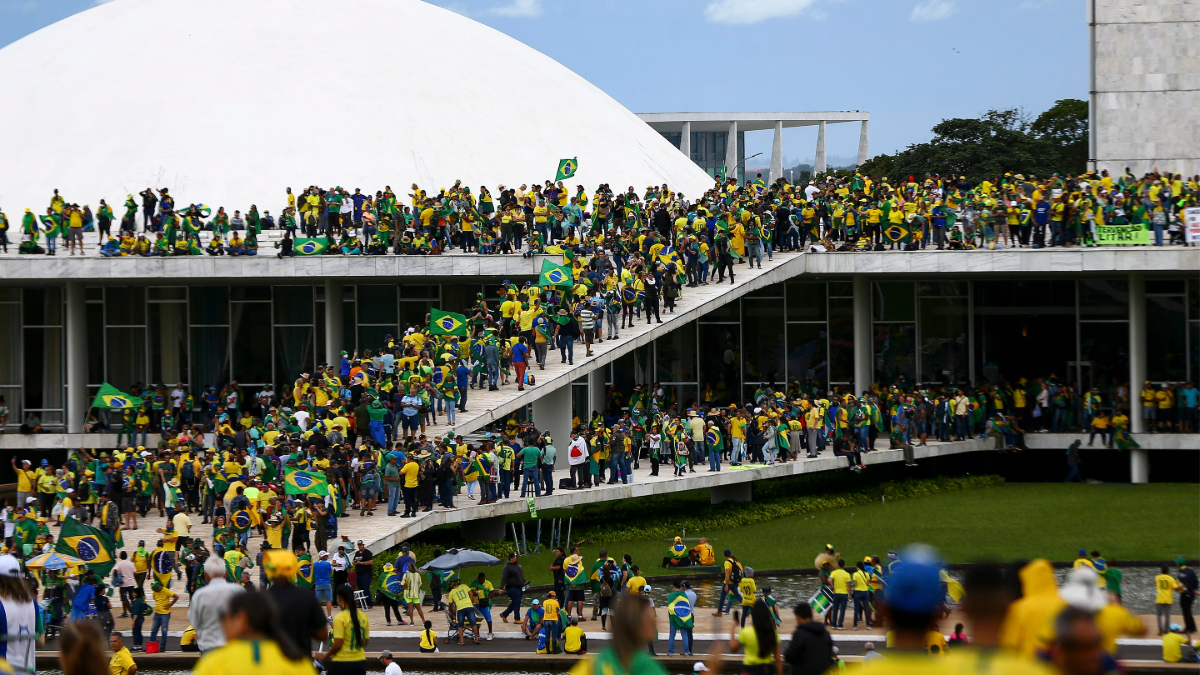Bolstering Election Credibility in the US and Brazil: The Impact of Prebunking and Validating Sources
Prithvi Iyer / Feb 28, 2024New research provides more evidence indicating the positive impact of prebunking and credible source correction, writes Prithvi Iyer.

Protestors and rioters at Brazilian government facilities in Brasilia, January 8, 2022.
The 2020 US election marked the first time a sitting US president attempted to overturn the outcome by advancing false claims of voter fraud. The so-called “Big Lie” mobilized Donald Trump’s voter base and culminated in the January 6th insurrection at the US Capitol. Brazil’s populist leader, Jair Bolsnaro, seemed to take a leaf from Trump’s playbook in his 2022 re-election campaign.
Like Trump, Bolsanaro made repeated claims of voter fraud and electoral malpractice in hopes of mobilizing his voter base. On January 8th, 2023, a week after his opponent, Lula da Silva, was sworn in as President, Bolsanaro’s supporters marched into the Congress building and sacked the facility. Thus, the US and Brazil witnessed the real-world impact of election-related disinformation. 2024 is an election year for Brazil and the United States. Examining effective ways of combating election mis- and disinformation is crucial to ensuring election integrity and preventing a repeat of what happened the last time these countries went to the ballot.
To shed light on practical solutions for increasing trust in elections, researchers from Dartmouth College, the University of Notre Dame, and the University of Exeter studied the efficacy of two approaches to combating election-related misinformation in the United States and Brazil. They compared the effectiveness of corrections from credible sources and prebunking misinformation before voters encounter it to see which approach improves election confidence.
Google has been testing prebunking techniques in Europe in its fight against misinformation. Google piloted a project in Poland where they released short videos dissecting fake news about Ukrainian refugees. The project's success led them to expand it to other EU countries like Germany. With tech firms championing this technique as an antidote to misinformation, scientific experiments evaluating its effectiveness are necessary to ensure we remain objective and refrain from exaggerating its impact.
Study Overview and Methodology
The researchers evaluated the effectiveness of credible corrections and prebunking in improving voter confidence through survey experiments in Brazil and the United States. Participants were randomized into three groups: credible source correction, prebunking with forewarning, and a placebo group. Participants in the “credible source correction” group received information from neutral sources or those speaking against partisan interests. For example, in the US case, participants received statements from Republican judges who spoke against their partisan interest and supported Joe Biden’s presidency. Similarly, for the Brazil case, participants received statements affirming Lula’s presidency from people speaking against their partisan interest, including Jair Bolsanaro’s son and his coalition partners in the legislature.
The pre-bunking correction instead warned voters “about election misinformation they may encounter (a forewarning) and seeks to counter those myths by describing the institutional mechanisms and protections” that ensure the integrity of the election process (providing information about existing policy). Participants in the prebunking condition received informational articles warning about potential misinformation in the 2022 midterm election. Thus, prebunking involved “a warning about potential future exposure to false claims and a message preemptively giving people accurate information before misinformation exposure.”
The two approaches have different temporal orientations. Thus, for the study conducted in the US, participants received credible source corrections about the 2020 US election (an event that has already occurred), while those in the prebunking condition received information about the 2022 midterm election, which had not happened when the study was conducted. By comparing the efficacy of these two approaches, the study shows whether forewarning voters about prospective fake news is more effective than changing beliefs about fake news that occurred in the past.
Results
Exposure to credible source corrections amongst US participants increased “belief that Biden was the rightful 2020 winner, increased confidence in the 2020 vote count, and diminished belief in the prevalence of fraud in 2020.” Conversely, the study found that while prebunking increased confidence in the ballot process, it did not reduce concerns that House seats could be won by fraud in the then-upcoming 2022 midterm elections. Both approaches improved the credibility of election results despite focusing on different elections. However, pre-bunking outperformed the credible sources approach in improving voter confidence over time. The study used follow-up surveys to make this determination. The researchers also evaluated the efficacy of prebunking with and without forewarning and found no significant differences. Thus, they concluded that the factual content determines the effectiveness of prebunking, not the warning message.
The findings were slightly different in Brazil. Exposure to credible source corrections “increased confidence in past (2022) and future (2026) elections and decreased the number of Chamber of Deputies seats believed to have been won by fraud in 2022.” However, this did not change beliefs about the prevalence of election fraud in either election or the number of seats a respondent believed could be won by fraud in 2026. Alternatively, participants exposed to prebunking through factual information about ongoing election security measures displayed greater confidence in the elections and decreased beliefs about the potential for fraud. Prebunking also helped participants identify and discern differences between true and false statements about election procedures.
Interestingly, the study found that prebunking had a more substantial impact on people who were previously most misinformed about the election. Thus, results from the study in Brazil show that, like in the US case, both approaches improved confidence in elections. However, prebunking was more effective than credible source corrections in Brazil, and the effects were strongest “among people who were most predisposed to believe fraud claims or most misinformed.”
Takeaways
Through experiments in Brazil and the United States, the researchers show that both credible source correction and prebunking are effective in “increasing electoral confidence and correcting misperceptions about fraud.” Both approaches increased voter confidence for past and future elections. Moreover, the efficacy of prebunking was strongest for those who were most misinformed. Despite both approaches having a net positive impact on improving public trust in elections, the authors believe that the prebunking approach has some practical benefits. For one, it does not require finding credible sources willing to speak against partisan interest, and facts needed for prebunking are easily available through “neutral sources.” This is because factual information about election integrity is not viewed as politically motivated. On the other hand, credible sources can also be ridiculed and seen as less credible because they are speaking against their party. Thus, if the source's credibility is questioned, the approach ceases to be effective.
The findings show that seemingly simple approaches to fighting misinformation can be effective. Questions remain on how to implement these strategies at scale and whether their efficacy lasts over time. Nonetheless, more evidence indicating the positive impact of prebunking and credible source correction provides actionable steps for lawmakers, civil society organizations, and social media companies to help bolster democratic legitimacy at a time when the ideal of a free and fair election is in peril.
Authors
